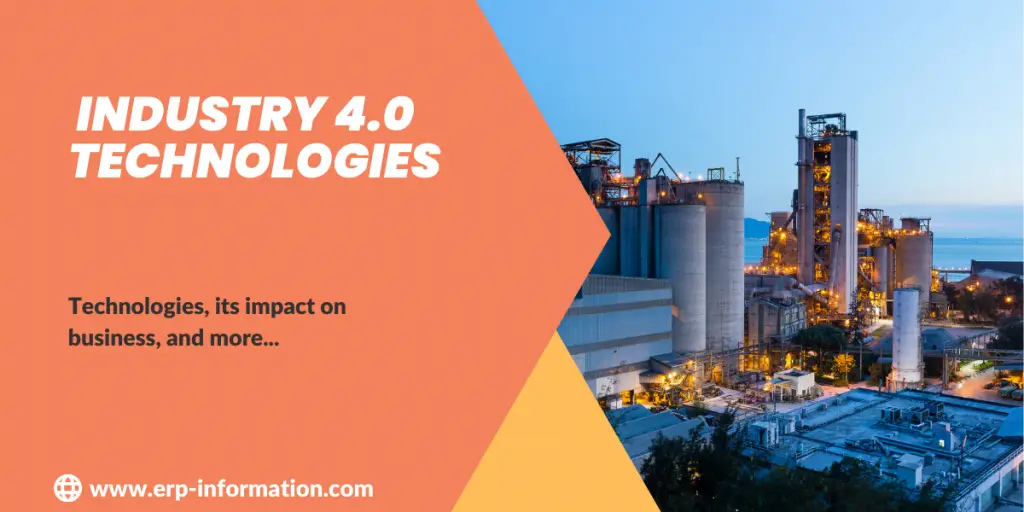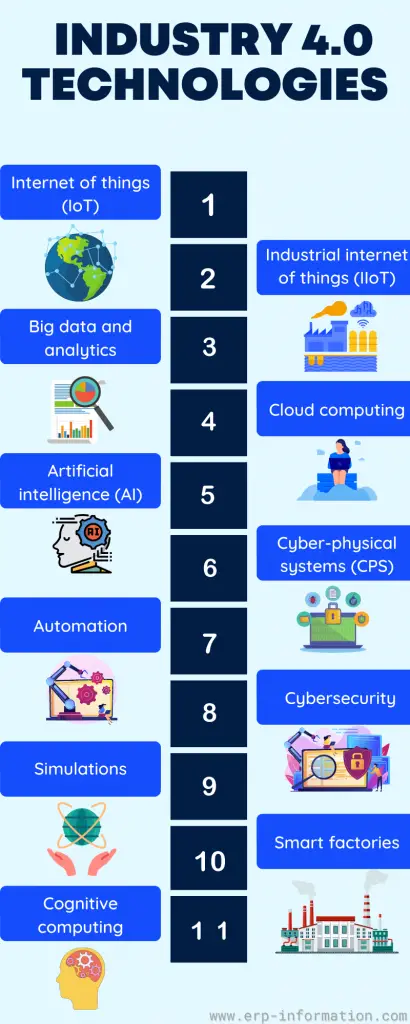Industry 4.0 is a term used to describe the fourth industrial revolution, marked by a shift from manual labor to automated processes, data, and technology to drive efficiency and productivity.
This blog post will list and explore Industry 4.0 technologies and their impact on your business.
What are Industry 4.0 Technologies?
Technologies in Industry 4.0 include the following:
What is Industry 4.0?
The fourth industrial revolution refers to the current automation and data exchange trend in manufacturing and other industrial sectors.
In addition, the trend is often referred to as the Industrial Internet of Things (IIoT), which refers to the increased use of digital technologies such as sensors, big data, cloud computing, and the Internet of Things (IoT) in manufacturing and other industrial sectors.
Internet of Things (IoT)
The IoT is a network of physical devices, vehicles, home appliances, and other items embedded with electronics, software, sensors, and connectivity tools that enable these objects to connect and exchange data.
Industrial Internet of Things (IIoT)
The Industrial Internet of Things (IIoT) is a term that describes the application of Internet of Things (IoT) technologies in industrial environments.
The IIoT involves the integration of physical objects and devices, such as machines and sensors, with digital systems, such as computer-aided design (CAD) and enterprise resource planning (ERP) software.
This integration allows industrial equipment to be controlled and monitored remotely and provides organizations with real-time data that can be used to improve efficiency and optimize operations.
Big Data and Analytics
Big data is a term used to describe businesses and organizations’ large volumes of data. This data can be structured data (such as customer records) or unstructured data (such as social media posts).
This data can improve decision-making, optimize processes, and create new products and services.
Cloud Computing
Cloud computing is a way to store, manage, and process data using remote servers that are accessed via the Internet.
It allows companies to have a single source of truth and share the data across the company with speed without fail. That will enable businesses to scale their operations without investing in on-premise infrastructure.
Artificial Intelligence (AI)
AI is one of the most critical technologies in the fourth industrial revolution. It is a branch of computer science that deals with developing intelligent systems.
It allows machines to learn, make decisions independently, and perform tasks that typically require human intelligence, which can help optimize processes and increase efficiency.
Several AI technologies include machine learning, natural language processing, pattern recognition, and decision-making.
10 Best Machine Learning Software
Cyber-Physical Systems (CPS)
Cyber-physical systems (CPS) are systems where physical and cyber systems are integrated and interact to share data and feedback.
CPS is used in various industries, including healthcare, automotive, manufacturing, transportation, energy, and logistics.
Automation
One of the key technologies of the latest revolution is automation. Automation can take many forms, from robotics on the factory floor to self-driving cars.
Automation can help to reduce costs, improve quality, and increase efficiency. However, planning and implementing automation to maximize its benefits is crucial.
Cybersecurity
Cybersecurity is a critical part of the fourth revolution and refers to the measures taken to protect digital systems from cyberattacks.
Cybersecurity aims to protect data and systems from unauthorized access, modification, or destruction. Therefore, cybersecurity is vital for all companies using Industry 4.0 technologies.
Simulations
Simulations are a great way to learn about and test Industry 4.0 technologies. With the help of simulation modules, manufacturing companies can enhance their machinery operations to run the following products.
Smart Factories
Smart factories are a crucial part of Industry 4.0 and refer to connected and automated factories. They use digital systems to collect data and feedback from the factory floor and use this data to optimize operations. Smart factories can help to improve quality, efficiency, and safety.
Cognitive Computing
Cognitive computing is a subfield of AI that deals with the simulation of human thought processes in computers. It allows machines to learn and understand human language and respond in a way that is similar to humans.
Cognitive computing can improve decision-making, optimize processes, and create new products and services.
Here are some more Industry 4.0 technologies.
Digital Twin
Manufacturers created digital twin because of digital transformation in Industry 4.0. It is one of the popular industry 4.0 technologies.
A digital twin is a virtual replication of a physical object or system. Using sensors, big data and analytics, and the Internet of Things (IoT), it’s possible to create a digital twin of just about anything.
That could include a city, building, product, or even an individual’s body.
The advantage of having a digital twin is that it provides a “digital mirror,” which can help improve operations or products.
For example, by analyzing data from the digital twin of a city, it might be possible to spot traffic congestion problems before they become actual problems.
Or by monitoring the performance of a product in the real world through its digital twin, companies can detect faults and potential flaws before the products are released.
Click here to get more information about Digital twin in Aerospace, Digital twin in Supply chain, and Digital twin in Construction.
Edge Computing
Edge computing is a decentralized network topology where data and services are distributed near the users and devices that need them. As a result, it dramatically improves performance and lowers the cost of providing These services.
Edge computing enables data collection, processing, analysis, and action to occur closer to the originating source or final destination instead of centrally in a data center.
That helps reduce latency and improve performance because it eliminates the need for information to travel through multiple networks and systems before reaching its destination.
It also can decrease power consumption and operational costs by reducing or eliminating the need for long-distance data transport.
Examples of Industry 4.0 Technologies used in businesses
Some examples of how new technologies are being used in businesses today include the following:
- Using sensors to track the performance of machines and equipment to optimize operations
- Using big data and analytics to track and analyze production data improves efficiency
- Using cloud-based applications and services to allow for real-time collaboration and data sharing
- Using 3D printing to create prototypes and customized products
- Using robotics and automated systems to improve manufacturing productivity
As you can see, Industry 4.0 technologies are being used in various ways to improve manufacturing operations. By implementing these technologies, businesses can become more efficient and productive.
If you want to improve your manufacturing operations, consider implementing some of these technologies.
Technologies and changing business operations
New technologies are changing how businesses operate by allowing them to be more efficient and productive.
- Industry 4.0 technologies can help companies track their inventory and production processes more accurately, leading to increased accuracy and fewer mistakes.
- It can help companies connect with their customers and suppliers in new ways, improving communication and collaboration.
- Industry 4.0 technologies can automate tasks and processes, freeing employees to focus on more critical tasks. Overall, the latest technologies are revolutionizing businesses’ operations and giving them a competitive edge.
FAQs
What are the benefits of Industry 4.0 Technologies?
Industry 4.0 technologies can help businesses improve decision-making, optimize processes, and create new products and services. They can also help to improve efficiency, safety, and quality.
How will Industry 4.0 Technologies impact your business?
They will have a significant impact on businesses across all industries. These technologies will enable companies to increase efficiency, reduce costs, and improve communication and collaboration. As a result, businesses that adopt the latest will be better positioned to compete in the global marketplace.
What is the impact of Industry 4.0 on the workforce?
New technologies fundamentally change how things are made and will profoundly impact the workforce. With the advent of the fourth revolution, there will be greater demand for workers with skills in advanced manufacturing, including additive manufacturing, robotics, and data analytics. The days of unskilled labor are numbered, and those who can adapt to the new technologies will be in high demand.
Conclusion
Industry 4.0 Technologies are the future of technology and will revolutionize how we live and work. We’ve outlined some of the most critical technologies that make up it so that you can familiarize yourself with them.
But remember that this is just a snapshot of what’s to come. As technologies continue to develop, we’ll see more amazing innovations that will make our lives easier, more efficient, and more connected than ever.
References


